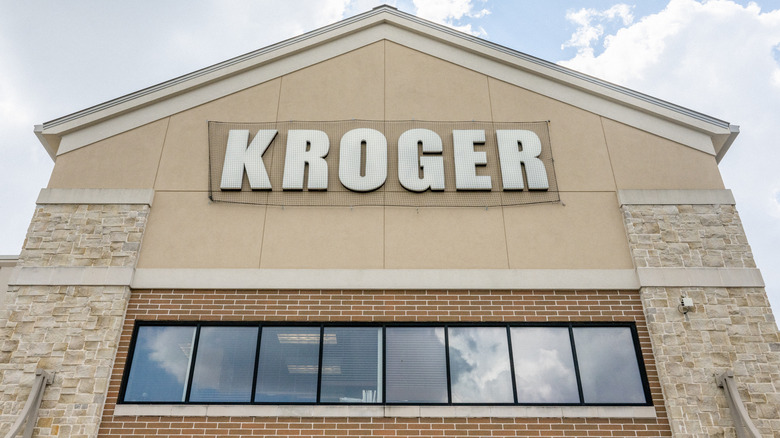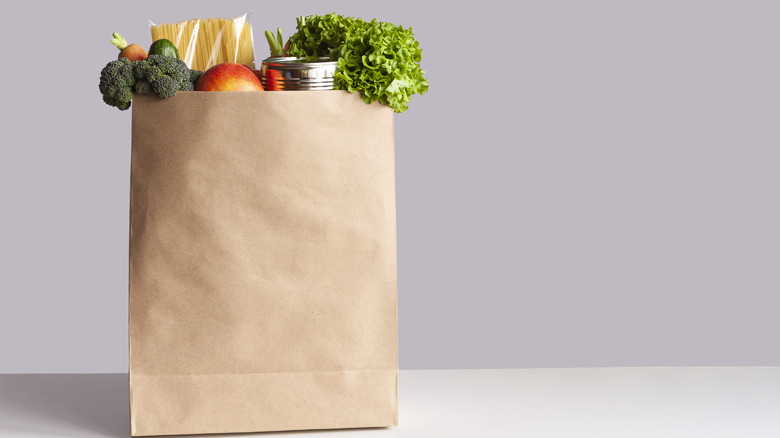Here's What Kroger Was First Called
Cincinnati, Ohio is known for a lot of things: breweries, food, Steven Spielberg, the Reds, and perhaps most importantly, Kroger Co. Walking into a supermarket today, it is easy to browse, locate, and select various products from stocked shelves throughout the store. It's also convenient to purchase freshly-baked goods and sliced deli meats from neighboring counters or get groceries delivered to your home for a low price. Even checking out has become effortless, with Kroger trying out electronic scanners for the first time in 1972, per the company's official website. With 2,800 stores nationwide, a variety of private brands, and a net worth of about $33 billion, Kroger Co. has earned its title as one of the top grocers in America and continues to retain that status today.
But one-stop shopping wasn't always this simple or convenient. In fact, before it was officially invented, it was just an innovative thought tied to the Kroger name. But before that and the ultimate legacy it became, this American dream began over 139 years ago, with two friends and a whopping $372 to their name.
It first opened as the Great Western Tea Company
Long before there was Walmart, Target, or Publix, there was Kroger. In 1883, Kroger opened for the first time as the Great Western Tea Company (per Britannica), making it the oldest grocery chain in America, according to Oldest.org. It was owned and operated by 23-year-old Bernard "Barney" Kroger and his friend B.A. Branagan. Kroger, who had worked as a clerk, farm aid, and salesman, wanted to open his own store after his partnership with another grocer was denied, via Immigrant Entrepreneurship.
With the $372 Kroger had in savings (about $11,000 in 2022), Kroger and Branagan opened their first store in Cincinnati. However, per Immigrant Entrepreneurship, the two faced many issues in the beginning, with the first being a tragic train and wagon collision during an attempted delivery. As a result, they lost their horse Dan, wagon, and accumulated over $500 in damages — more than the two initially invested in the store. Then, in 1884, the Great Flood happened, when rain and snow caused the Ohio River to flood the city, according to OhioMemory.org. This caused another $350 in damages.
Still, Kroger was determined. By 1885, he bought Branagan's share of the company, and in the early 1900s, Kroger's stores expanded across the city under the name Kroger Grocery and Baking Co., per Britannica. It officially adopted the name Kroger Co. in 1946 and became one of the largest grocery chains in America by the 1980s.
Setting a precedent for future retailers
Kroger's business was unique compared to other grocers at the time, eventually setting a precedent for future shopping. In 1901, it became a prime retailing shop, selling various goods under the same roof rather than designating a separate store for each item, per the official Kroger website. This made shopping both simple and a pleasure for consumers, which were some of Barney Kroger's top priorities.
He was also determined to become his own supplier. After all, Kroger's slogan was: "Be particular. Never sell anything you would not want yourself." That same year, according to Britannica, he created his own bakery and sold fresh-baked goods, kickstarting the beginning of one-stop shopping trends. A meat market followed shortly after. However, despite Kroger's influence in self-service shopping, the first market that officially incorporated this method was Piggly Wiggly in 1916, a grocery store in Memphis, Tennessee (per Smithsonian Magazine).
Today, grocery store delivery has advanced with third-party apps like Uber Eats, Door Dash, and Instacart. Still, it remains a novel form of technology for many supermarkets, like Walmart, which started their curbside and pick-up services in 2019, per Tech Crunch. According to Statista, online revenue for grocery retailers will reach $24 billion and 150 million shoppers in 2023. With these numbers in mind, it's safe to say Barney Kroger's initial effort has expanded dramatically since his first store and horse-and-wagon expeditions.


